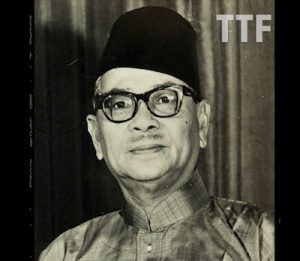TTF: The late Tunku Abdul Rahman was Siamese mixed, in that his mother, Che Manjalara (Nueang Nandanagara), was of Thai descendancy and the sixth wife of Sultan Abdul Hamid.
Che Manjalara was the daughter of Luang Naraborirak (Kleb Nandanagara), a district officer in Thailand who was closely associated with Chirapravati Voradej, the Prince of Nakhon Chaisri and Minister of Thai Defense from 1901 to 1913.
Chirapravati Voradej was the son of King Chulalongkorn (Rama V).
It follows, that the late Tunku’s aristocratic bent stems not only from the bloodline he shares with his late father, the late Sultan Abdul Hamid Halim of Kedah, but also from his late mother’s associations and ties with the royal family of Thailand through Chirapravati Voradej, son of Chulalongkorn (Rama V).
Not everyone is aware of this.
Many are under the impression that the warm ties Malaysia shares with the royal family and military of Siam have to do with treaties and agreements undertaken between the state of Kedah and Siam through wheeling and dealing contrived by the British.
But the fact remains, that the associations the late Tunku had with the King of Siam had everything to do with an aristocratic connection tracing all the way to 19th century Siam which he and his mother kept closely guarded for a multitude of reasons.
Some of these reasons were made known by the Tunku himself to several of his associates in absolute confidentiality, though he used to joke, that what happened to these secrets after his death was no concern of his.
Right around the time Malaya achieved independence, the Tunku sensed a problem, as not only did the British deprive the Government of Malaya (GoM) of sufficient foreign reserves to manage the economy, most of these reserves were parked in private banks that were either indigenous or clan based and run as if they were Godfather corporations.
The Tunku knew that some of these clans were associated with the MCA and saw this to be a problem in terms of the Malay economy.
Realising that the MCA would lay conditions for the use of these reserves, he turned to the Penang branch of Mercantile Bank Limited, which, at the time, had yet to be absorbed by the The Hongkong and Shanghai Banking Corporation.
To offset some of the loans he got his proxies to take on behalf of UMNO, he sought assistance from the (then) King of Siam, the late Bhumibol Adulyadej Siamindradhiraj.
It was on Che Manjalara‘s account that King Bhumibol offered monetary assistance and intelligence knowhow to the Tunku’s people from 1958 right up to 1965, four years prior to the 1969 general election.
Had Bhumibol not assisted the Tunku, there is no telling if Parti Perikatan would have sustained the relentless attacks by Gerakan and the DAP or if Dr Mahathir Mohamad or even the late Tun Abdul Razak would ever have become Prime Ministers.
Mahathir is set to visit Thailand later this month.
While I do welcome the move, I feel it was a grave error on his part not to have preceded his visits to other sovereign states with a gesture of goodwill to King Vajiralongkorn Bodindradebayavarangkun, son of the late King Bhumibol Adulyadej Siamindradhiraj.
Perhaps Mahathir is not aware what took place behind the scenes from 1958 to 1965, or the fact that the late King Bhumibol is among the reasons why the MCA was not able to wrestle its way through the economy by dictating terms to UMNO.
![]()
BANGKOK: There is an air of anticipation over the forthcoming visit by Malaysian Prime Minister Tun Dr Mahathir Mohamad to Thailand later this month, especially in bringing the much-needed progress into the ‘deadlocked’ southern Thai peace talks.
Expert believed the two-day visit by Malaysia’s seventh Prime Minister to Bangkok on Oct 24 and 25 was vital in breaking the current stalemate plaguing the current peace talks between the Thai government and Mara Patani.
“Dr Mahathir’s visit will be significant to the progress of the peace talks, which has been a stalemate,” Dr Srisompob Jitpiromsiri, a longtime analyst to conflicts in southern Thailand, told Bernama recently.
The academician at the Prince of Songkla University (PSU) in Pattani said the bilateral visit by the Malaysian leader would be a significant step for both governments, as they collaborate to solve the problems in southern Thailand.
Srisompob, one of the founders of Deep South Watch (DSW), a non-governmental organisation monitoring the conflict, said he believed Dr Mahathir and his new point man to the peace talks, Tan Sri Abdul Rahim Noor, would bring ‘new proposals for Bangkok’s consideration.
Abdul Rahim, Malaysia’s former Inspector General of Police (IGP) and new facilitator to the peace talks, is a man with ‘wide experience in dialogue process in southern Thai’ and is expected to be among Kuala Lumpur’s entourage to Bangkok later this month, he said.
Abdul Rahim replaced Datuk Seri Ahmad Zamzamin Hashim.
Malaysia has been facilitating the southern Thai peace process since late 2014, arranging several rounds of talks between delegations from the Thai government and Mara Patani.
Thailand on its part is also on the verge of appointing a new lead negotiator to replace General Aksara Kerdphol, with former Army 4th Region commander General Udomchai Thammasarorath set to be officially named to take the post next week.
One of the ‘new proposals’ under consideration and could be presented during the visit would be on the inclusion of new ‘groups or factions’ to Mara Patani, which if implemented would make the peace talks more inclusive and substantive than ever before.
The inclusion of new parties to Mara Patani could potentially include the military wing of Barisan Revolusi Nasional (BRN) and different faction in Pulo (Pattani United Liberation Organisation), which were not included during the current peace talks.
The participation of military wing of BRN and Pulo in Mara Patani, if true, would be good and positive to the peace talks, said Srisompob, adding that the inclusion of the ‘new groups’ would make the peace process more stable and effective.
The inclusion of BRN’s military wing would also be significant to the peace talks as the shadowy but most well-armed and influential group in southern Thailand had been blamed for much of the violence in the deep south.
Its exclusion in the current Mara Patani-led negotiation with the Thai government had been cited as one of the prime reason for the talks’ snail-pace progress and eventual ‘stalemate’, especially regarding the implementation of the Safety Zone.
The addition of BRN’s military wing and other groups, according to the academician, would also push the peace talks to enter its most important phase with both sides begin discussion on the ‘core issues’ of the conflict, regarding the group’s demand for southern Thailand’s autonomy.
Srisompob said the Thai sides had been trying to evade from discussing the issues, but the “inevitable has come”.
“The issues of southern Thai autonomy or decentralisation as demanded by the groups might be difficult for the Thai side (to discuss).
“It might be a bitter pill for the Thai side to swallow, but it is inevitable (for both sides to discuss),” said Srisompob.
Between 6,500 to 7,000 lives have been lost due to the armed conflict in southern Thailand since 2004, according to DSW, which constantly monitors the conflict.
Source: The Sun Daily




